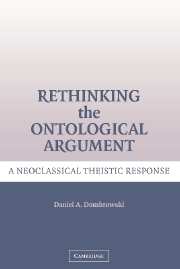Book contents
- Frontmatter
- Contents
- Acknowledgments
- Introduction
- 1 Historical Background
- 2 Poetry versus the Ontological Argument: Richard Rorty's Challenge
- 3 Deconstructionism and the Ontological Argument: The Case of Mark Taylor
- 4 Is the Ontological Argument Worthless? Graham Oppy's Rejection
- 5 Oppy, Perfect Islands, and Existence as a Predicate
- 6 Rival Concepts of God and the Ontological Argument: Thomas Morris, Katherin Rogers, and Alvin Plantinga
- Bibliography
- Index
2 - Poetry versus the Ontological Argument: Richard Rorty's Challenge
Published online by Cambridge University Press: 16 July 2009
- Frontmatter
- Contents
- Acknowledgments
- Introduction
- 1 Historical Background
- 2 Poetry versus the Ontological Argument: Richard Rorty's Challenge
- 3 Deconstructionism and the Ontological Argument: The Case of Mark Taylor
- 4 Is the Ontological Argument Worthless? Graham Oppy's Rejection
- 5 Oppy, Perfect Islands, and Existence as a Predicate
- 6 Rival Concepts of God and the Ontological Argument: Thomas Morris, Katherin Rogers, and Alvin Plantinga
- Bibliography
- Index
Summary
Daniel Dennett asks whether the stirrings of Richard Rorty's later ideas can be seen in between the lines of his “early” papers in analytic philosophy of mind. The differences between the two Rortys are encapsulated in the two different definitions found in Dennett's joke dictionary of philosophers' names. The first is that a “rort” is “an incorrigible report, hence rorty, incorrigible.” The second, by way of contrast, is the adjective “a rortiori,” which refers to something that is “true for even more fashionable continental reasons”. Dennett rightly wonders about how Rorty went from being an author who wrote for a small coterie of analytic philosophers of mind in the early 1970s to being what Harold Bloom, say, sees as an international man of letters, indeed as the most interesting philosopher in the world! (Dennett 2000; Malachowski 2003).
One of my purposes is to push back Dennett's concerns even further, to the early 1960s, when Rorty was very much interested in process philosophy and neoclassical theism, as is evident from his publications from this period (Rorty 1963a; 1963b; 1963c; 1963d). We can analogously ask whether the stirrings of Rorty's later ideas can be seen in between the lines of his really early papers, which deal with Alfred North Whitehead and Charles Hartshorne.
- Type
- Chapter
- Information
- Rethinking the Ontological ArgumentA Neoclassical Theistic Response, pp. 32 - 61Publisher: Cambridge University PressPrint publication year: 2006

